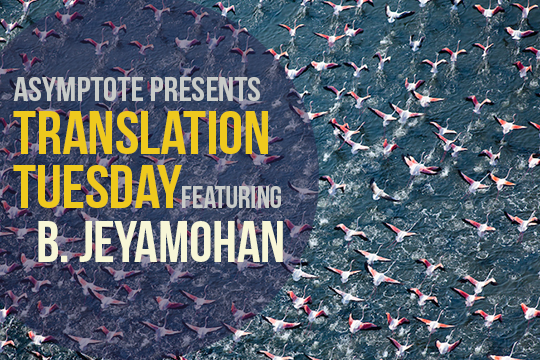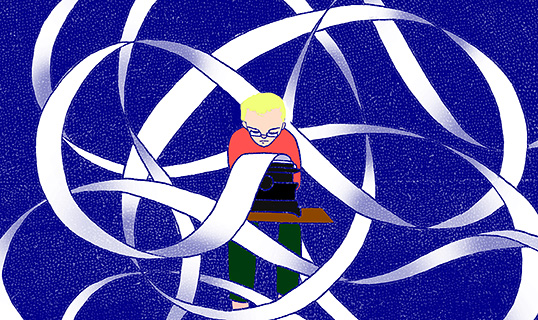Continuing our spotlight on Close Approximations contest winners, we present today the top entry in the fiction category, notable for being the first Asian translation to receive the top award in the history of our contest, now into its third edition. (Find the official results and citations by judges David Bellos and Sawako Nakayasu here.) From 215 fiction and 128 poetry submissions, these six best emerging translators were awarded 3,000 USD in prize money, in addition to publication in our Summer 2017 edition. Judge David Bellos says: “There were several contenders for second place, but I have absolutely no doubt that the prize itself must go to the charming, wonderful, unusual story of “Periyamma’s Words” by the Tamil writer B.Jeyamohan in Suchitra Ramachandran’s translation. It is a witty and heart-warming tale illustrating the paradoxical position of translation itself, as a way of crossing boundaries and as a way of understanding what boundaries cannot be crossed.”
Come, go, stop, food, clothes, son, daughter, road, house, sky, earth, night, day—these words came rather easily to her. If I said those words in Tamil, Periyamma would reply with the corresponding English words. It was only when Periyamma jumped to say ‘cat’ before I could say poo– that I realized I was quizzing her in order. So I changed the order. But then Periyamma started saying the English words just by looking at my eyes. So I pointed at different animals and asked what they were. Periyamma said naai, poonai, kozhi in Tamil and then translated them—‘dog,’ ‘cat,’ ‘hen.’ It was only after Periyamma had mastered a hundred basic words—she would say them even before I could ask—that I moved on to concepts. That was when all hell broke loose.
Periyamma was not my periy-amma, big-mother, a name usually reserved for one’s maternal aunt. But everybody in our town called her that. Her house, they called the Big House. Situated in the town centre, that bungalow was built by Periyamma’s grandfather Thiruvadiya Pillai a hundred and fifty years ago. The word about town is that when it was built, the glass for the house sailed in from Belgium, the teak came from Burma, the marble from Italy, and the iron from England. The people who came to grind limestone for its walls stayed on permanently in our town, and as a result our town acquired a Lime Street. Our carpenters also moved in during that period. Periyamma’s wedding took place in that bungalow. That was the first time a mottaar came to our town. The newlyweds were paraded about town in that Ford motor car. Periyamma was not to step foot into that car ever again.
It has been forty years since Periyamma’s husband passed away. Her only son Arumugam Pillai had been a lawyer in Madurai, and he died there. His four sons were variously placed in Chennai and Delhi and Calcutta. None of them are alive now. A daughter of the oldest grandson is a doctor in America. She is the only person who has some semblance of a relationship to Periyamma. Periyamma went on living in that town, an ancient relic in the eyes of its fourth-generation inhabitants. In the olden days their family had six thousand acres of land to their name. Over the years, it had shrunk in various ways to a hundred acres. Those hundred acres had been neatly partitioned and sold over thirty years ago. In the end, all that was left over for Periyamma was that house, two acres of land around it, a good sum in the bank, and her jewelry. But that was more than enough for her to live in state.
READ MORE…




